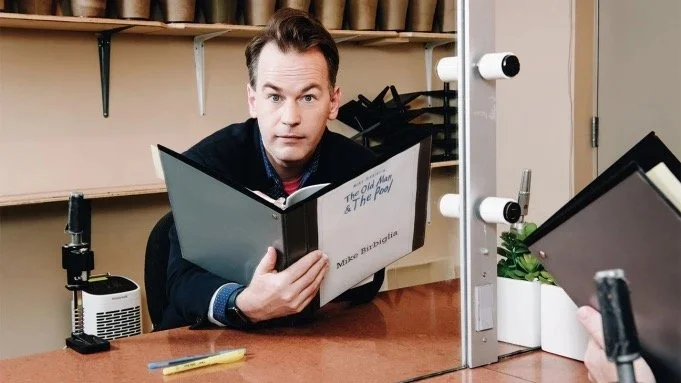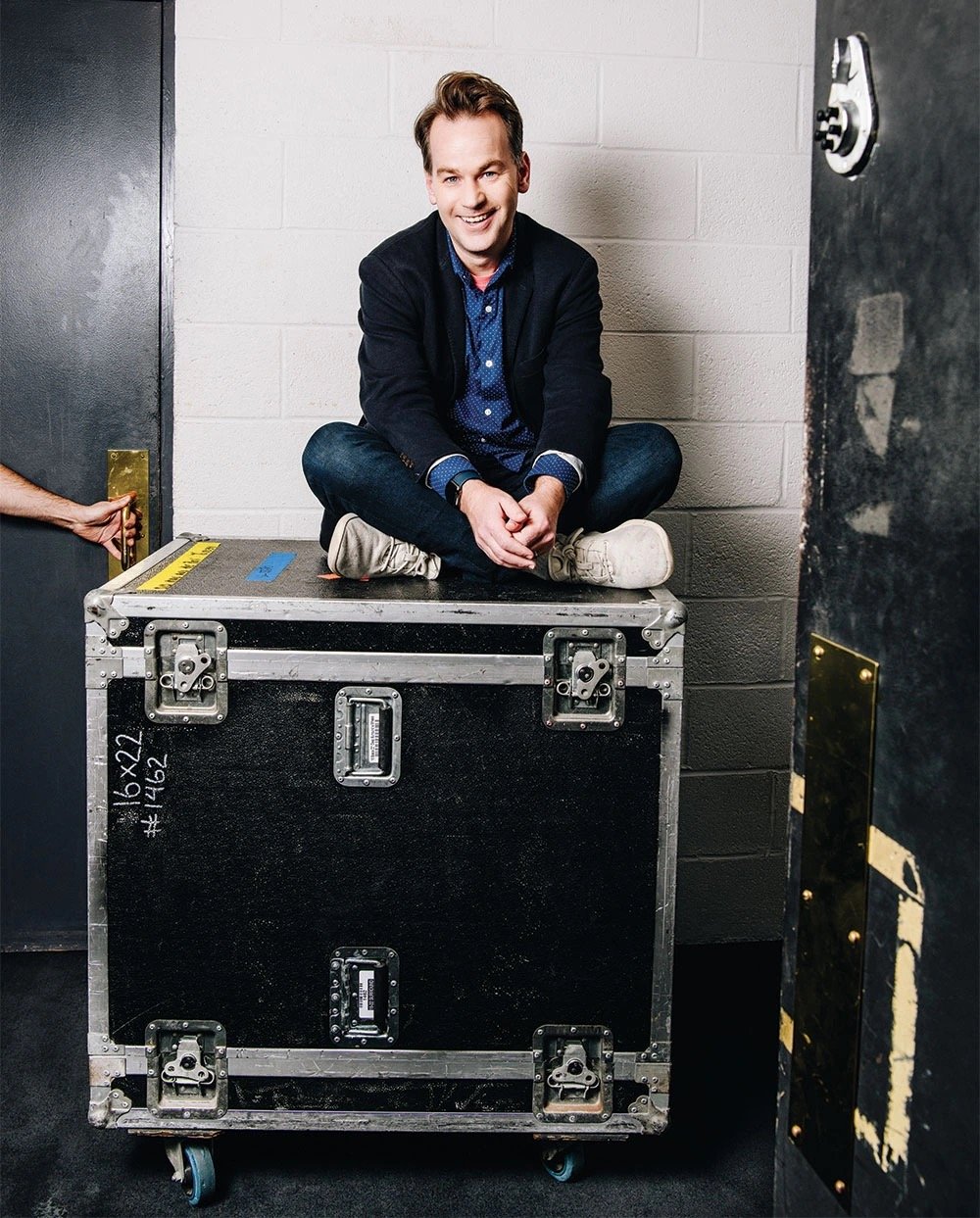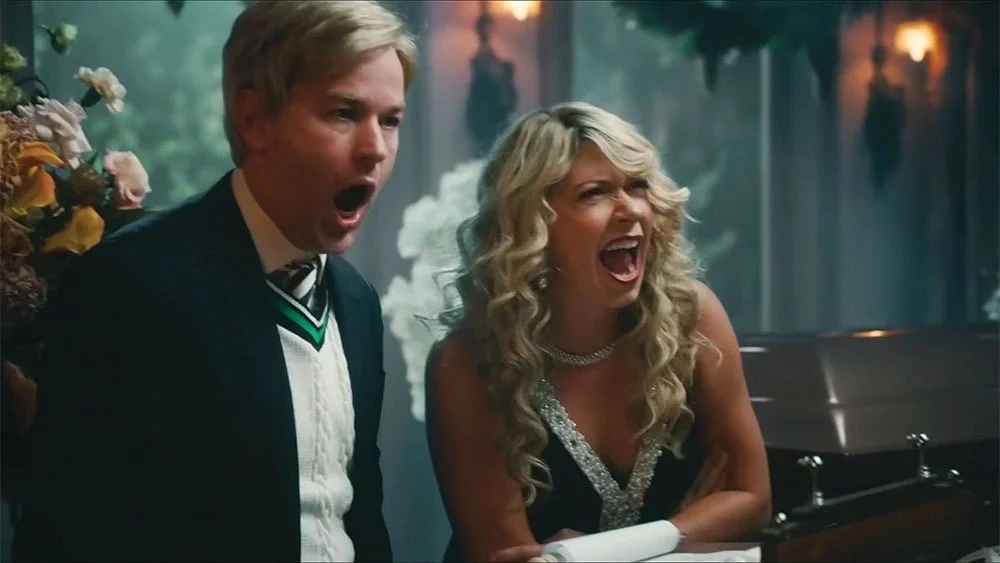Mike Birbiglia Does Not Have Time for “the Golden Age of TV”
With his latest Broadway show, 'The Old Man and the Pool,' comedy’s erudite goofball (and recent Taylor Swift collaborator) explains the difference between stand-up and theater and why he’ll always reject sitcom offers: "The endgame for me is not being rich."
“I’m all about guesting,” says Birbiglia of his TV goals. He was photographed Oct. 18 in his dressing room at the Vivian Beaumont Theater in New York. PHOTOGRAPHED BY NINA WESTERVELT
The first thing Mike Birbiglia does before staging one of his one-man shows at a new venue is sit in every seat. “I try to understand what the sightlines are, how they can hear. I’m obsessed with it because that’s all we have,” he says over Zoom in October, hiding in daughter Oona’s bedroom from the noise of Brooklyn construction outside. “The intimacy is everything.”
Birbiglia is known as a comedian, a filmmaker (2016’s Don’t Think Twice), a podcaster and a for-hire actor — recurring on Billions and, more recently, making a memorable cameo in Taylor Swift’s “Anti-Hero” music video. But it’s his plays, narrative interpretations of stand-up, that have always distinguished him from his peers. He’s now 44 and committed to shirking Hollywood for his life in Brooklyn with wife Jen Stein (the poet who publishes under the pen name J. Hope Stein) and prefers his current commute in to Manhattan to a year on the road. This latest show, a contemplative and comic look at mortality called The Old Man and the Pool, kicked off the first of what was to be 70 shows on Broadway at the 1,000-seat Vivian Beaumont Theater on Oct. 28 — though it’s since been extended by two weeks. “That’s three Madison Square Gardens,” Birbiglia clarifies. “I drive my agent nuts.”
You tour and workshop shows for years before they get to this stage. What do you cut first?
For the last show, The New One, the beginning is a two-and-a-half-minute monologue about how much I love my couch and how it’s a metaphor for home, domesticity, comfort and love. The status quo of my life is the couch. But, on the road, I would talk about the couch endlessly, like the way Jim Gaffigan goes at fast food or Hot Pockets. You cut things way down, figure out what’s essential for the interrelated parts and echoes of the couch later in the show — which is what makes it different from stand-up. People ask me a lot, “What’s the difference between stand-up comedy and a play?” [A play is] a single piece. If you take one element out, it would fall apart.
When did you identify this as the way you work best?
Necessity is the mother of invention. I wanted to be a playwright and a screenwriter. Toward the end of college, I realized that’s not a job on Monster.com. But you’re so naive that there isn’t a logic to it. So, I was simultaneously in the improv group and then I entered the “Funniest Person on Campus” contest at Georgetown.
Mike Birbiglia PHOTOGRAPHED BY NINA WESTERVELT
Did you win?
I won. Nick Kroll was in it, too. That’s how we met. It gave me the chance to be an opening act one night at the Washington, D.C., Improv. I asked if I could do it again, and they said, “No, but you can work the door and sell tickets.” Then I got to watch the great comedians of the ’90s. Margaret Cho, Jake Johannsen, Mitch Hedberg, Jim Gaffigan, all these people who I couldn’t afford to go see otherwise — watching them again and again, the repetition of their acts and how they evolved.
But what they were doing was different from where you ended up.
When I got out of college, I took road gigs anywhere anyone would take me. I was primarily an opening act. Once I was able to start headlining, doing 45 minutes to an hour, that’s when I started to perform pieces of my first solo play, Sleepwalk With Me. I wanted to work on a play, but I don’t have a place to do it, so a comedy club is as good as any. That’s just become my process. I’ll work out material anywhere. I’ll work it out at an NRDC fundraiser.
You booked David Letterman’s show at 24, which helped your transition to headliner. Did you realize it was a “big break” then?
I think so. Throughout my 20s, every article about me was, “This guy’s the next big thing!” Same with my 30s. Now, in my 40s, I’m “the veteran of comedy.” People don’t know how to position me because it never happened for me in the Seinfeldian or Ray Romano way. That was oddly by choice. When I was 30, I got a CBS sitcom pilot greenlit. Nick Kroll and Bob Odenkirk were in it with me, but it didn’t get picked up. In that moment, it hit me like a ton of bricks: I don’t want to be a sitcom star. And it’s not like they don’t still call. I’m everything that networks think they want.
Why’s that?
Because I smile a lot. (Laughs.)They’re like, “Oh, we can mold this person. This is perfect for us.” I had to come to grips with the idea that the endgame for me is not being rich. The endgame is making something that makes me proud.
The Seinfeld/Romano sitcom path is gone, but is there a Birbiglia version of Barry or Ramy that’s appealing?
I love Barry, Ramy and Mo Amer’s show, but no. I don’t like serialized storytelling. I’m obsessed with the 90-minute story. Obsessed. Everyone’s like, “It’s the golden age of TV!” Who has the time? In 90 minutes or two hours, I want to meet characters, understand a world, go on a journey and land somewhere that’s slightly different from the beginning. I want to feel something and laugh, then walk away and talk about it with my wife. That’s it.
If you took money out of the equation, would you prefer to release your work as filmed specials or comedy albums?
When it comes to stand-up, I’m most interested in the audio. The imagination can do a lot of work. And if you listen to a Steve Martin record from the ’70s, there are visual gags, but you get a sense for it. Ira Glass taught me this about radio over the years. Audio is so intimate. You feel like you are with the person. To be clear, theater is different. It’s designed so that we’re all there together.
Have you noticed any career or audience shift since your week pinch-hitting for Jimmy Kimmel this year?
That was a very educational experience. You realize, when you do something that mainstream and wide-reaching, the legitimacy that a network platform still gives you. People came out of the woodwork. Certain people were treating me like I had made it. They were like, “You know, you could do this.” I’m like, “No, no, no, I do this other thing!”
Late night requires topical humor, which has never been your bag. Did you ever have any interest in being more topical?
Certainly not now. When I was doing Kimmel in May, the leak came out about Roe v. Wade. I was like, “I cannot possibly write a joke that meets this moment. I workshop jokes for years, never mind two hours.” The times we’re living in are so radical, I don’t want to touch the majority of those things. As I’ve gotten older, I’ve really thought about what I’m contributing. How is this helping? I think what I can do is make something that is human and funny but doesn’t pull any punches.
But you must butt heads with some of these things on the road.
I did Texas, Florida, Georgia and Tennessee with this show. I end up talking to a lot of Trump supporters just because they like to talk. There seems to be a big talking point in that universe about how comedians “can’t say anything anymore.” I know what they mean, but I think that statement is incorrect. The biggest misstep, in terms of the public relationship with art at this moment, is that we have to agree with the artist. Comedians say wild shit. They always have.
“It reminded me a lot of working with Judd Apatow or Abbi Jacobson or The Lonely Island guys” says Birbiglia, who stars with Mary Elizabeth Ellis in Swift’s “Anti-Hero.” “The vibe is so laid back that you don’t feel like you’re in a pressurized work situation. It’s just a very improvisational atmosphere. In my experience, that’s the best incubator for creating something spontaneously funny.”
During your recent podcast episode with Chris Gethard, you talked about your push to court a global audience. What sacrifices or edits does that require?
Eddie Izzard was so ahead of her time. She was playing Ukraine, Russia, Germany and China 10 years ago. She told me, “You’ve got to go see the world. People everywhere love English-speaking comedy.” In June, I went with this show to London, Iceland and France. Part of the reason why I go is I want the show to be so human that it can play everywhere. I try to rip out all American cultural references.
If you’re playing Iceland, for example, do you have to contextualize the YMCA?
Iceland is a funny example, because I have all these jokes about how awful YMCA water is. Meanwhile, Iceland has the best water and public pools in the world. So, at the top of the show, I’d be like, “I talk a lot about going to the YMCA pool, which is a kind of like a rec center in America. I know that your pools are really nice, but mine aren’t.”
Who do you find funny right now?
Atsuko Okatsuka is great. Zarna Garg is fascinating. Sarah Sherman is like a bat out of hell. The fact that there’s this cultural encouragement for diversity of voices in comedy makes the comedy way funnier. The stuff that people talk about is so different. And the dividends are going to be massive for where comedy goes.
You recently appeared in Taylor Swift’s “Anti-Hero” music video. Does that offer come through your team or directly from her?
I’ve met Taylor a few times through Jack Antonoff, who’s a close friend of mine. Anyway, one day I get this text message from an unknown number and it says “Hey, it’s Taylor. I wrote this script for a short film in the middle of my video.” And then I read the script, and it’s so hilarious and absurd and I’m laughing, but I’m also thinking, “Is Taylor Swift texting me or is this someone else catfishing me?” Anyway, I go for it. I say, “I’m in.” But I’m in for what? Either I’m in a Taylor Swift video or I’m being conned by someone who is an excellent writer.



